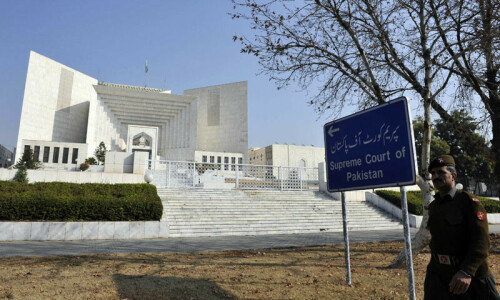Several renowned former parliamentarians, as well as a former president of the Sindh High Court Bar Association, challenged the 26th Amendment in the Supreme Court on Friday in two separate but similar petitions, arguing that “a vote cast under coercion is no vote at all.”
Month-long political negotiations concluded on October 20 as the 26th Constitutional Amendment Bill, also known as the Constitutional Package, became law following approval from both houses of parliament.
The newly enacted amendment has brought numerous changes to the judiciary — including taking away the Supreme Court’s suo motu powers and empowering parliamentarians to nominate the next chief justice of Pakistan from among the three most senior SC judges.
One of the petitions on Friday was jointly filed by Akhtar Mengal, president of Balochistan National Party—Mengal (BNP-M) and former chief minister of Balochistan; former speaker of the National Assembly Fahmida Mirza; former MNA Mohsin Dawar, who is also chairman of the National Democratic Movement (NDM); and Mustafa Nawaz Khokhar, a former senator and advisor to the prime minister on human rights.
The other petition was filed by Salauddin Ahmed, a lawyer and former president of the Sindh High Court Bar Association.
Both petitions assailed the 26th Constitutional Amendment on two counts — notably the manner in which it was passed, and that “certain provisions of the said Act fundamentally undermine essential features of the Constitution relating to [the] independence of the judiciary and trichotomy of powers.”
Both petitions requested the top court to declare that the amendment was passed in a manner “contrary to the Constitution and law … and has no legal effect.”
They also requested that an independent inquiry be directed for “the manner in which votes were coerced and procured in Parliament.
Ahmed’s petition requested that the court “set aside the proceedings, acts and decisions and directions of the so-called Judicial Commission meeting” held on November 5.
It further requested to strike down the Supreme Court (Practice and Procedure) (Amendment) Act 2024 and the Supreme Court (Number of Judges) (Amendment) Act 2024 as being a “colourable exercise of legislative power and being violative of the independence of the judiciary”.
The two pieces of legislation were among six bills passed on Monday in both the National Assembly and Senate. One of the bills sought to increase the number of Supreme Court judges, and another sought extension of the terms of armed services chiefs.













































Dear visitor, the comments section is undergoing an overhaul and will return soon.